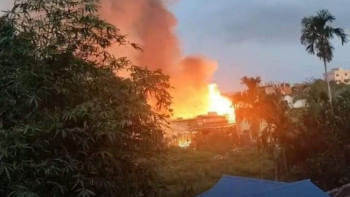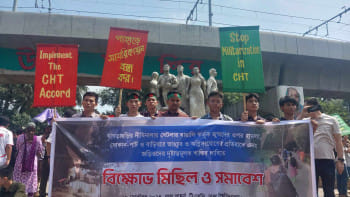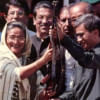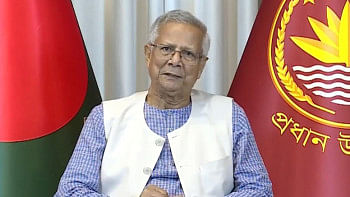End exploitation of Indigenous communities

We are deeply troubled by what happened on Thursday afternoon and then overnight in Khagrachhari's Dighinala upazila, which once again showed how vulnerable the Indigenous communities are to violence and displacement. These people were historically exploited by Bangalee settler groups and majoritarian politicians, and the recent change of guard in Dhaka has done little to improve the situation. Thursday's events, according to a report, began as a protest over the lynching of a Bangalee man accused of motorcycle theft the previous day, and then quickly spiralled into a cycle of violence that led to the deaths of three people, numerous injuries, and the destruction of over 100 houses and shops, many set afire and even looted.
It goes without saying that Indigenous people have suffered the brunt of the violence, which spread to Rangamati on Friday and caused a similar mayhem. We must understand that this is not simply a case of lawlessness; it's emblematic of the complex ethnic, political and security dynamics that have long plagued the Chittagong Hill Tracts (CHT). There are differing narratives surrounding the origin of Thursday's violence—with some Bangalees claiming that peaceful protests were interrupted, and Indigenous people asserting that the attacks were unprovoked—which only highlight the role of misinformation in such fluid situations, and how quickly it can fuel unrest. Equally notable is the failure of law enforcement authorities to protect the victims from attacks. Panic still grips the region even though security has been beefed up.
The alarming frequency of such incidents, even after the overthrow of an autocratic regime that viewed the CHT crisis only through the lens of security and majoritarian interests, calls for a critical rethink about the Indigenous experience in Bangladesh. At a public gathering held in Dhaka on Friday, activists rightly demanded exemplary punishment for those involved in vandalism and arson attacks. But the recurrence of such attacks, they said, largely owes to the state's failure to fully implement the CHT Accord. We cannot agree more. The non-implementation of this accord has not only held off a political resolution to fundamental Indigenous issues such as land ownership and various rights, but also caused tensions that frequently disturbed the region.
This cycle of tensions and attacks has to be broken. While bringing a zero tolerance approach to any instigation and rumours that put Indigenous communities in harm's way is paramount, the interim government should also look at the bigger picture and eradicate the vulnerability of these marginalised people altogether by fully implementing the accord. We urge the government to declare its plans with regard to the accord without delay. Simply adopting a law enforcement approach to these issues is no longer enough.


 For all latest news, follow The Daily Star's Google News channel.
For all latest news, follow The Daily Star's Google News channel. 










Comments